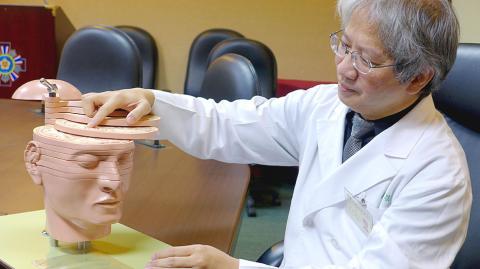A research team led by psychiatrists and scientists at Taipei Veterans General Hospital and National Yang-Ming University’s Institute of Brain Science has found that people with gender identity disorder (GID) are characterized by structural and functional alterations in the brain.
People with GID are conflicted between their biological sex and their gender identity.
The research team found, by means of functional connectivity magnetic resonance imaging (fcMRI), that the neural connectivity between the part of the brain associated with GID and that with social brain network shown by transsexuals differs — by being more active — from how it is displayed in their non-transsexual counterparts.

Photo: Hung Su-ching, Taipei Times
GID in the brain is believed to contribute to the control of sexual behavior, and the social brain network is the neural structure that is responsible for social interactions such as interpersonal relations, conflict monitoring and punishment adjustment.
The study also found that “transsexuals identify, when viewing male-female couples in erotic or non-erotic [“neutral”] interactions, with the couple member of the desired gender in both situations,” while the non-transsexual controls only did so in the erotic situations.
“The increased connectivity between the area in the brain that is associated with biological sex, sexual characteristics and behavior, and the area associated with social functions such as emotional conflicts, has formed a neural network of ‘system memory’ that is absent in non-transsexuals,” said Hsieh Jen-chuen (謝仁俊), one of the authors of the report and a professor at the institute. “And the presence of the network reflects the conflicts they have experienced both psychologically and physically.”
The psychosocial maladaptation evidenced by the difference of neural connectivity patterns in transsexuals “suggests a brain signature of the psychosocial distress for the gender-sex incongruity of [transsexuals],” the researchers said.
Psychiatrist Lee Ying-chiao (李鶯喬), one of the authors, said that among the 517 GID patients she has seen in the past 18 years, half exhibited symptoms of depression.

The manufacture of the remaining 28 M1A2T Abrams tanks Taiwan purchased from the US has recently been completed, and they are expected to be delivered within the next one to two months, a source said yesterday. The Ministry of National Defense is arranging cargo ships to transport the tanks to Taiwan as soon as possible, said the source, who is familiar with the matter. The estimated arrival time ranges from late this month to early next month, the source said. The 28 Abrams tanks make up the third and final batch of a total of 108 tanks, valued at about NT$40.5 billion

Travel agencies in Taiwan are working to secure alternative flights for travelers bound for New Zealand for the Lunar New Year holiday, as Air New Zealand workers are set to strike next week. The airline said that it has confirmed that the planned industrial action by its international wide-body cabin crew would go ahead on Thursday and Friday next week. While the Auckland-based carrier pledged to take reasonable measures to mitigate the impact of the workers’ strike, an Air New Zealand flight arriving at Taipei from Auckland on Thursday and another flight departing from Taipei for Auckland on Saturday would have to

A group from the Taiwanese Designers in Australia association yesterday represented Taiwan at the Midsumma Pride March in Melbourne. The march, held in the St. Kilda suburb, is the city’s largest LGBTQIA+ parade and the flagship event of the annual Midsumma Festival. It attracted more than 45,000 spectators who supported the 400 groups and 10,000 marchers that participated this year, the association said. Taiwanese Designers said they organized a team to march for Taiwan this year, joining politicians, government agencies, professionals and community organizations in showing support for LGBTQIA+ people and diverse communities. As the first country in Asia to legalize same-sex

MOTIVES QUESTIONED The PLA considers Xi’s policies toward Taiwan to be driven by personal considerations rather than military assessment, the Epoch Times reports Chinese President Xi Jinping’s (習近平) latest purge of the Chinese People’s Liberation Army (PLA) leadership might have been prompted by the military’s opposition to plans of invading Taiwan, the Epoch Times said. The Chinese military opposes waging war against Taiwan by a large consensus, putting it at odds with Xi’s vision, the Falun Gong-affiliated daily said in a report on Thursday, citing anonymous sources with insight into the PLA’s inner workings. The opposition is not the opinion of a few generals, but a widely shared view among the PLA cadre, the Epoch Times cited them as saying. “Chinese forces know full well that